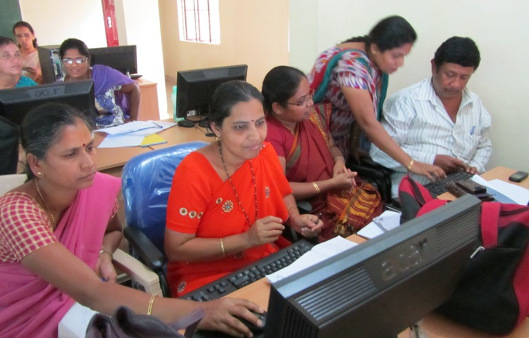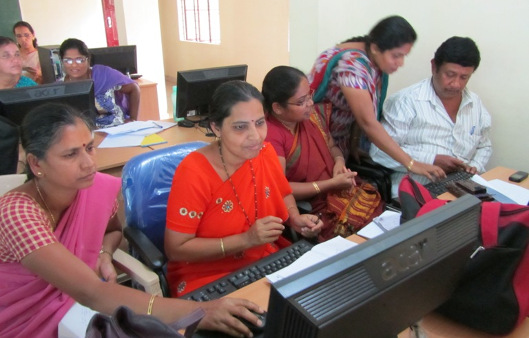IT for Change is the resource institution for the Subject Teacher Forum (STF) “in-service teacher education” program for high school teachers in Karnataka. The Karnataka Open Educational Resources (KOER) program is a component of the STF. The KOER program was started in 2013-14 by DSERT Karnataka, in collaboration with IT for Change. ITfC trained around 300 Government High School teachers on this collaborative “Open Educational Resources” (OER) programme embedded within the STF to access, create, review, adapt, share and publish OERs.
Teachers are working on creating supplementary and complementary resources as per the state syllabus. The KOER portal is developed in English and Kannada (state language of Karnataka) languages.
ITfC conducted a participatory action research of the KOER programme, to understand “whether and how, a bottom-up approach, where participants collaboratively and actively co-create contextual resources ('embedded' within a 'community of learning'), can support effective OER models” The objectives of this case study were to understand how a collaborative learning community can support a sustainable environment for OER access-creation-curation-publishing as well as become a systemic method of teacher professional development in the public education system. The broad objectives of the action research were as follows:
-
To study how a collaborative (KOER) OER model can be embedded within a local ecosystem of a “community of teachers” (STF), in Karnataka state, in India
-
To understand how such a locally anchored, collaborative OER model can develop effective processes of creation-curation-adoption that contribute to sustained use of OER and teacher development
-
To understand how such a model can contribute to the creation of local and contextual OER
The study was a part of a global study on OERs in the global south – the Research on Open Educational Resources for Development (ROER4D). The ROER4D project, anchored by the University of Cape Town, aims to provide evidence-based research from a number of countries in South America, Sub-Saharan Africa and South east Asia. The primary objective of the programme is to improve educational policy, practice, and research in developing countries by better understanding the use and impact of OER.
Resource creation workshops were conducted for a select cohort of 67 mathematics, science and social science high school teachers and in these workshops, discussions on the nature of OER, collaborative resource creation, use of digital methods and resources, teacher development etc have provided useful insights.
Participant teachers responded to structured questionnaires and participated in focus group discussions on these aspects. In addition, the research studied the nature of resources created and patterns of access, creation and sharing on the STF forums and on the KOER portal.
The study suggests that teachers are able to use digital methods to adopt OER, and to contextualize it to their needs. The OER processes have aided teacher professional development through increasing teacher agency in the exploration and utilization of resources, and in their active collaboration with peers. Based on interviews with key actors, comprising these 67 teachers, teacher educators and education administrators, the systemic factors that enabled and constrained the participatory resource creation model have been analyzed.
The participatory resource creation model, used in this action research has been acknowledged as a national best practice by the report of the third Joint Review Mission (JRM) of the Ministry of Human Resource Development, Government of India. Other state governments have evinced an interest to adapt this model in their own in-service teacher education programmes.
In the second phase of the ROER4D research program, IT for Change is developing a 'professional learning community' based collaborative OER adoption model, by expanding the STF program to other states in India.


